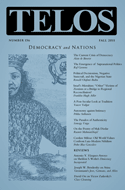The following paper was presented at the Seventh Annual Telos Conference, held on February 15–17, 2013, in New York City.
 German philosopher Martin Heidegger’s magnum opus, Being and Time (1927), constitutes one of the most important contributions to philosophy of the last century. Beyond having a defining influence on numerous fields of study within philosophy that include but are not limited to existentialism, post-structuralism, and deconstruction, Heidegger has often been viewed as “the most creative religious writer of the twentieth century” (Ireton, 243). It should thus not be surprising that his ideas were widely received and regarded by Iranian intellectuals and students before (and after) the Iranian Revolution of 1979. One of the main seeds of Heideggerian thought that blossomed particularly well in the Iranian context was his notion of authenticity (Eigentlichkeit). Used by Heidegger to draw ontological distinctions, authenticity inspired a politicized discourse—among its Iranian readers—on a return to an “authentic” self. The authenticity of the Iranian return to the self firmly grounded on a separation from imposed Western ideals. A tendency among Iranians toward the study of existentialism[1] in addition to Heidegger’s poignant critique of a decadent West cloaked in religious terminology made him an excellent partner to a group of Iranian intellectuals unsatisfied with a despotic monarch perceived to be antagonistic to Islam.
German philosopher Martin Heidegger’s magnum opus, Being and Time (1927), constitutes one of the most important contributions to philosophy of the last century. Beyond having a defining influence on numerous fields of study within philosophy that include but are not limited to existentialism, post-structuralism, and deconstruction, Heidegger has often been viewed as “the most creative religious writer of the twentieth century” (Ireton, 243). It should thus not be surprising that his ideas were widely received and regarded by Iranian intellectuals and students before (and after) the Iranian Revolution of 1979. One of the main seeds of Heideggerian thought that blossomed particularly well in the Iranian context was his notion of authenticity (Eigentlichkeit). Used by Heidegger to draw ontological distinctions, authenticity inspired a politicized discourse—among its Iranian readers—on a return to an “authentic” self. The authenticity of the Iranian return to the self firmly grounded on a separation from imposed Western ideals. A tendency among Iranians toward the study of existentialism[1] in addition to Heidegger’s poignant critique of a decadent West cloaked in religious terminology made him an excellent partner to a group of Iranian intellectuals unsatisfied with a despotic monarch perceived to be antagonistic to Islam.
 The ideal of authenticity has become a prevalent ethical ideal with an immense impact on popular culture. Authenticity is no longer restricted to the periphery of philosophy, and prominent thinkers have recently reintroduced it as a central philosophical issue. However, contemporary accounts do not seem to pay sufficient attention to how the ideal of authenticity and certain practices in capitalism have shaped each other reciprocally. This essay attempts to make initial steps toward filling this gap.
The ideal of authenticity has become a prevalent ethical ideal with an immense impact on popular culture. Authenticity is no longer restricted to the periphery of philosophy, and prominent thinkers have recently reintroduced it as a central philosophical issue. However, contemporary accounts do not seem to pay sufficient attention to how the ideal of authenticity and certain practices in capitalism have shaped each other reciprocally. This essay attempts to make initial steps toward filling this gap. 

